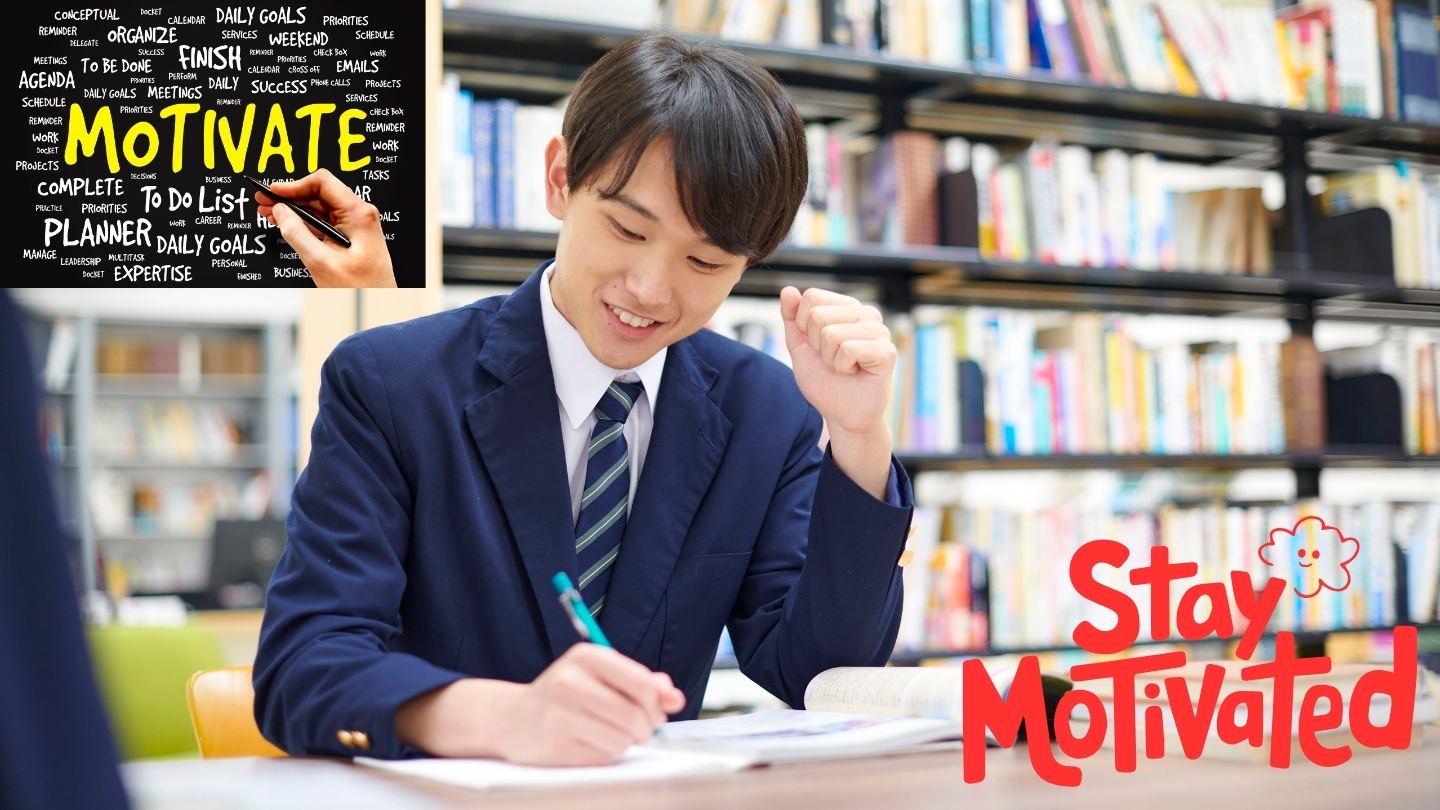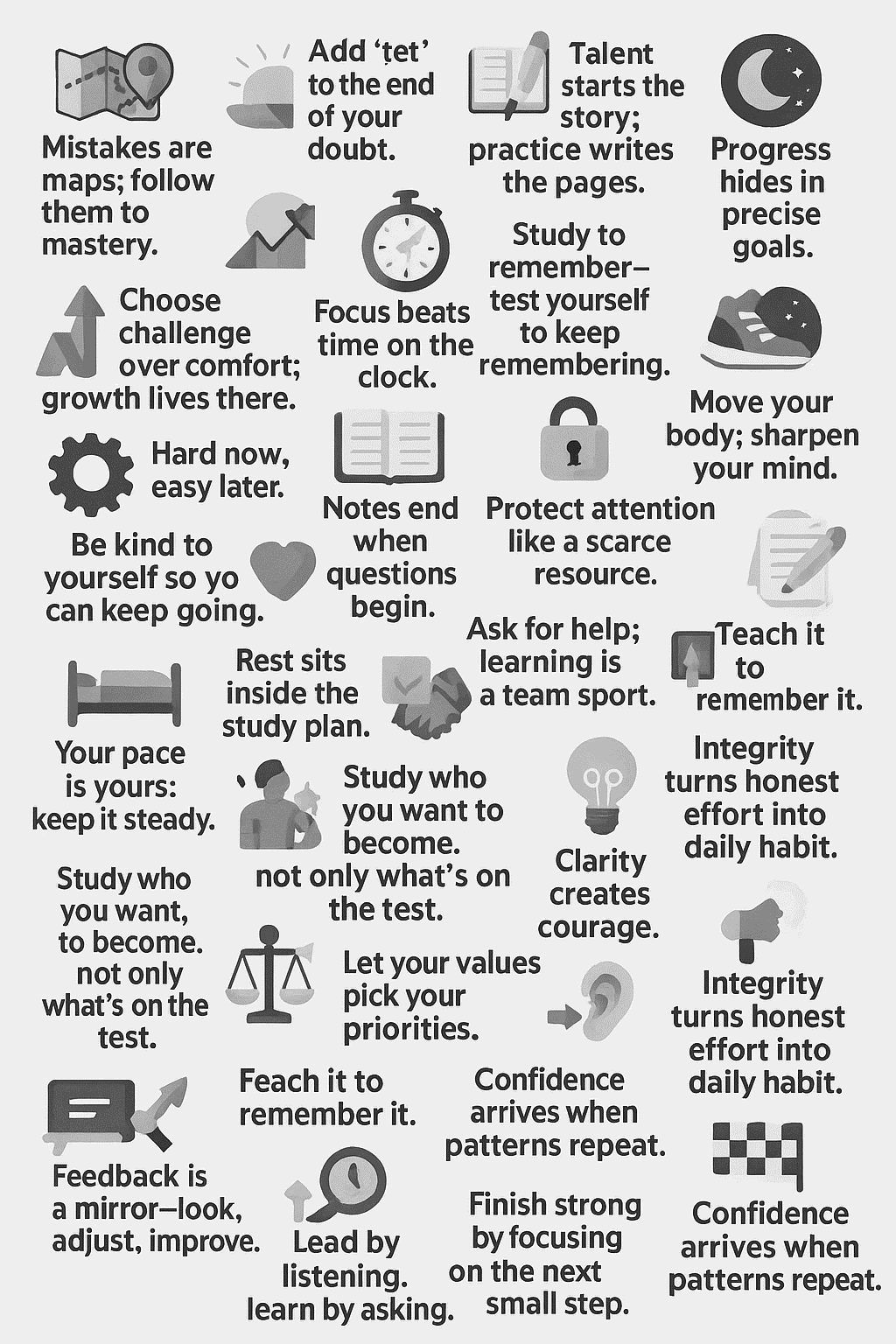
33 Inspirational Quotes for Students (With How-To Tips)
Students thrive when motivation and method work together. Three needs—autonomy, competence, and relatedness—predict stronger motivation and well-being, which supports steady study habits.
Retrieval practice and spaced repetition build long-term memory more reliably than rereading. Mixing problems and practice conditions feels harder at first, yet it strengthens recall later. Goal clarity and short “if-then” plans improve follow-through under stress.
Brief movement sharpens attention; regular sleep helps both memory and emotion control. Laptop multitasking and media multitasking undermine comprehension and focus. A quick bout of expressive writing before an exam can ease anxiety and lift scores.
Use this guide as a practical bridge from inspiration to daily actions—small steps, repeatable plans, and research-backed habits.
Table of Content
- 33 Inspirational Quotes for Students (With How-To Tips)
- How to use this guide
- Quotes for Mindset & Mastery
- Quotes for Focus, Habits & Learning
- Quotes for Resilience & Well-Being
- Quotes for Purpose, Values & Integrity
- Quotes for Collaboration & Leadership
- Quotes for Exams & Performance Moments
- A step-by-step playbook
- A quick example from practice
- Key takeaways
- FAQs
- Conclusion
How to use this guide
-
Pick three quotes that fit your current need: mindset, focus, or exams.
-
Turn each quote into a tiny action with an if-then cue: If it’s 7:30 pm, then 25 minutes on calculus set C.
-
End every session with self-testing, then schedule short spaced reviews (for example: 1-3-7-14 days).
-
Study in device-free blocks; avoid tab hopping.
-
Add a brisk walk before heavy study; protect sleep during exam weeks.
Quotes for Mindset & Mastery

1) “Mistakes are maps; follow them to mastery.”
Use it: After checking answers, log one error, one cause, one fix; re-test tomorrow. (retrieval + spacing)
2) “Add ‘yet’ to the end of your doubt.”
Use it: Change I can’t solve derivatives to I can’t solve derivatives yet, then plan one targeted set. (growth mindset cue)
3) “Talent starts the story; practice writes the pages.”
Use it: Two focused 25-minute blocks with self-testing beat a scattered hour. (testing effect)
4) “Curiosity is a muscle—train it daily.”
Use it: Add one “why?” to every reading page and answer from memory.
5) “Progress hides in precise goals.”
Use it: Replace study chemistry with complete 12 stoichiometry items at ≥80%. (specific, challenging goals)
6) “Choose challenge over comfort; growth lives there.”
Use it: Swap one easy drill for a mixed set that targets weak areas. (desirable difficulties)
Quotes for Focus, Habits & Learning
7) “Small wins compound like interest.”
Use it: Tie a 60-second review to a daily anchor (after lunch → two flashcards). (habit cue + spacing)
8) “Focus beats time on the clock.”
Use it: One device-free 25-minute block often outperforms 60 scattered minutes. (attention costs of multitasking)
9) “Study to remember—test yourself to keep remembering.”
Use it: End each session with a 5-item recall quiz. (testing effect)
10) “Space your study; let memory breathe.”
Use it: Revisit tough topics after 1, 3, 7, then 14 days. (spacing effect)
11) “Hard now, easy later.”
Use it: Mix topics and vary conditions to deepen retrieval routes. (desirable difficulties)
12) “Plan the moment, not the mood.”
Use it: If 7:00 pm, then open Set C, 25 minutes, then one recall round. (implementation intentions)
13) “Notes end when questions begin.”
Use it: Turn each heading into a question; answer without looking, then check. (retrieval practice)
14) “Protect attention like a scarce resource.”
Use it: Phone in another room; only the needed tabs open. (classroom laptop multitasking harms learning)
15) “Move your body; sharpen your mind.”
Use it: Take a brisk 10-minute walk before a difficult set. (acute exercise benefits attention/executive control)
Quotes for Resilience & Well-Being
16) “One tough day is a data point, not a destiny.”
Use it: Write a two-line debrief: what happened, what changes tomorrow.
17) “Be kind to yourself so you can keep going.”
Use it: After a poor quiz, write three lines of self-compassion, then one small adjustment. (self-compassion links to healthier goals and coping)
18) “Rest sits inside the study plan.”
Use it: Keep a stable sleep window; review earlier in the evening. (sleep supports memory and emotion regulation)
19) “Anxiety shrinks when it has a page to sit on.”
Use it: Before a big test, spend 10 minutes on expressive writing. (improved exam scores in field studies)
20) “Ask for help; learning is a team sport.”
Use it: Each week, bring one targeted question to a peer or mentor; motivation grows when relatedness is met.
21) “Your pace is yours; keep it steady.”
Use it: Track streaks of short daily sessions rather than cramming. (spacing beats massed practice)
Quotes for Purpose, Values & Integrity
22) “Study who you want to become, not only what’s on the test.”
Use it: Link tasks to a value—service, curiosity, craftsmanship—to sustain effort. (autonomy and internalization support persistence)
23) “Let your values pick your priorities.”
Use it: When tasks compete, choose the one that fits a core value today. (SDT need satisfaction and motivation quality)
24) “Clarity creates courage.”
Use it: Write one sentence: I’m learning this to do X for Y people.
25) “Integrity turns honest effort into daily habit.”
Use it: Pair a chosen quote with one measurable action today; repeat tomorrow. (if-then planning supports follow-through)
Quotes for Collaboration & Leadership
26) “Teach it to remember it.”
Use it: Explain a concept to a friend from memory; gaps reveal what to review next. (retrieval practice)
27) “Feedback is a mirror—look, adjust, improve.”
Use it: After feedback, list one change and apply it within 24 hours. (specific goals drive action)
28) “Lead by listening; learn by asking.”
Use it: Enter group study with two questions prepared.
29) “Respect the effort of others and your own will rise.”
Use it: Set a shared target for the session; debrief for 2 minutes at the end. (relatedness + competence)
Quotes for Exams & Performance Moments
30) “Prepare for the question, not the chapter.”
Use it: Convert headings into likely exam questions; answer cold, then check. (testing effect)
31) “Calm begins with a plan you can see.”
Use it: Draft a simple exam-day script: sleep window, short walk, 10 key Q&As, arrival buffer. (sleep and exercise research)
32) “Confidence arrives when patterns repeat.”
Use it: Schedule weekly mock questions; track errors; revisit on 1-3-7-14. (spacing + retrieval)
33) “Finish strong by focusing on the next small step.”
Use it: On the test, scan instructions, answer what you know first, then loop back.
A step-by-step playbook
Pick three quotes and anchor them
Choose one quote for mindset, one for focus, one for exams. Tie each to a tiny action that takes 10–60 seconds. Example: after dinner → two flashcards. Short cues win over vague intentions.
Write if-then plans
“If 7:00 pm, then Set C for 25 minutes.” If-then plans raise the odds of starting, especially when distractions loom.
Use spaced review
Set calendar pings for 1-3-7-14 days. Mix in quick recall checks.
Make retrieval the default
Close the book, answer out loud or on paper, then verify. Regular self-tests lead to stronger long-term memory than rereads.
Build helpful difficulty
Rotate topics, shuffle question types, and vary conditions. Early effort feels higher, yet later recall improves.
Protect attention
Block notifications, put the phone in another room, keep only the needed tab. Laptop multitasking lowers comprehension for users and nearby peers.
Support the brain
A short walk primes attention. A steady sleep window supports memory and calmer mood.
Ease exam pressure
Ten minutes of expressive writing before a high-stakes test can lift performance, especially for anxious students.
A quick example from practice
A first-year student felt stuck with long rereads and weak recall. We swapped rereading for two short self-tests per session, added a 1-3-7 day review loop, and wrote one if-then cue for evenings. She used Quote 31 for exam days and added a 10-minute walk before heavy sets. Scores rose through the term, and study time felt clearer and calmer.
The ingredients were small: self-testing, spacing, a plan she could see, and one supportive routine.
Key takeaways
-
Link inspiration to implementation with if-then plans.
-
Prefer retrieval + spacing over rereading.
-
Add desirable difficulty through mixed practice.
-
Guard attention; multitasking lowers learning.
-
Support body and brain with brief movement and steady sleep.
FAQs
1) How many quotes should I use at a time?
Two or three works well. Pick one for mindset, one for daily focus, one for exam days. Tie each to a tiny action with an if-then cue.
2) Do short, focused blocks beat long, distracted sessions?
Yes. Device-free blocks with retrieval practice outpace scattered hours built on rereading.
3) Does walking before study help?
A brief walk can sharpen attention and executive control, which supports the next learning block.
4) How can I calm pre-exam nerves without losing time?
Spend 10 minutes on expressive writing, then review a short set of likely Q&As. Field studies report performance gains.
5) Is rereading enough?
Rereading has limited payoff. Treat self-testing and spacing as the default.
Conclusion
Quotes spark intention; plans and practice lock in progress. Pick three lines that match your current challenges. Attach them to small, clear actions. Test yourself often, space your reviews, keep one calm routine for exam days, and protect sleep. Small wins add up.
Students Study Motivation

